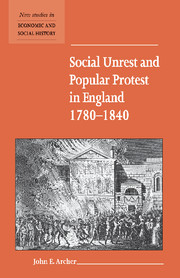Book contents
4 - Industrial protest
Published online by Cambridge University Press: 05 July 2015
Summary
Industrial protest was probably second only to consumer protest in the eighteenth century but soon surpassed the latter by the second decade of the nineteenth century, when the most famous episodes and examples of direct action and industrial sabotage bequeathed a new word to the English language – Luddism. The word, now commonly associated with opposition to new technology, certainly possessed, in part, that meaning in 1811 when the Luddite disturbances first broke out in Nottingham. As a movement, however, Luddism appears to have been much more complex in character and, as a consequence, has been a subject of considerable debate. Moreover, although Luddism is undoubtedly the most widely researched phenomenon of industrial protest, it represents just one facet of a continuum of labour struggles and tactics. Early works by the Webbs and the Hammonds, though useful in providing detail and powerful description, have largely been superseded by the works of Rule, Randall, Thompson and Thomis, to name but a few. Their research has located industrial protest more precisely in its community contexts rather than simply placing it in the socioeconomic context of industrialisation or modernisation. Modern scholars, by placing these struggles within their communities, have been able to show how the wealth of communal resources, craft traditions and solidarities enabled workforces to prolong disputes. In addition, the reaction of local authorities was as important in prolonging or ending these disputes. The fact that industries were regional and dominated by one or two occupations was both a strength and a weakness for protesters. Moreover, by viewing protest in the context of location, the importance of chronology and tradition have become increasingly evident. In times of extreme tension and distress, such as towards the end of the Napoleonic wars, industrial protest could, it has been argued by some historians, easily become politicised (Charlesworth et al. 1996: 32; Dinwiddy 1979). This too has been disputed, but such disagreements should at least alert the student to the dangers of compartmentalising too securely the various forms of protest. Food rioting, machine breaking and political radicalism might well have been present in the same dispute.
- Type
- Chapter
- Information
- Social Unrest and Popular Protest in England, 1780–1840 , pp. 42 - 56Publisher: Cambridge University PressPrint publication year: 2000

